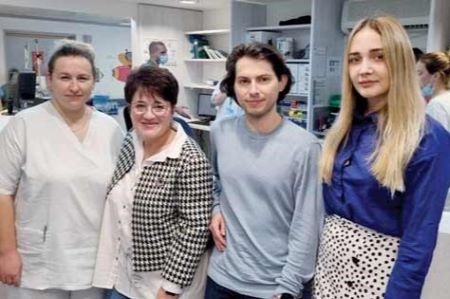
Two Ukrainian doctors and a nurse from Kyiv’s 600-bed National Cancer Institute are undergoing training in advanced cancer treatment at Hadassah Hospital Ein Kerem under the guidance of Prof. Polina Stepensky, head of the Bone Marrow Transplant and Immunotherapy Department. Prof. Stepensky was born in Ukraine and made aliyah as soon as the USSR opened its gates. The current images of her childhood home being bombed horrify her. She feels a personal commitment to reach out and volunteer her help in the area in which she is a world expert.
A month into the three-month training program, Iryna Sacyk, a Ukrainian oncology nurse, has been impressed by the patient-centered approach at Hadassah and the flexibility in treating bone marrow transplantation patients.
“In Ukraine, we put the patients in deep isolation, but here I learned that flexibility actually lowers the rates of infection,” she says.
The two Ukrainian doctors, Dr. Anisiia Luchkiv and Dr. Nazar Shokun, are internalizing the process of treatment that makes use of multi-disciplinary experts from other fields.
“At our hospital, we concentrate on the disease and don’t ask about mental status—how the patient feels. I see that building trust with the patients helps in implementing treatment,” says Dr. Shokun.
Prof. Stepensky’s team members have all chipped in to show the visitors “the Hadassah way” and to highlight treatment modalities. These include the development of Hadassah’s own CAR T therapy to treat multiple myeloma, a method that was previously only available in the United States and China because of the high cost. The Hadassah version is much less expensive and is already saving lives in Israel, with the potential of saving thousands of lives around the world.
